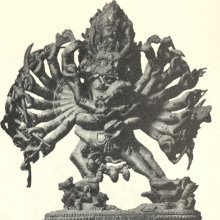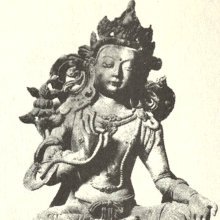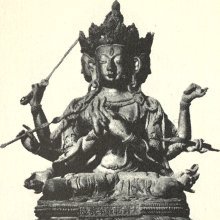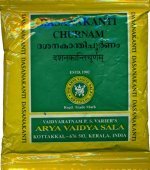Gu, Gū: 13 definitions
Introduction:
Gu means something in Hinduism, Sanskrit, Marathi, Hindi, biology. If you want to know the exact meaning, history, etymology or English translation of this term then check out the descriptions on this page. Add your comment or reference to a book if you want to contribute to this summary article.
Images (photo gallery)
(+751 more images available)
In Hinduism
Ganitashastra (Mathematics and Algebra)
Source: archive.org: Hindu MathematicsGu (गु) refers to the “operation of multiplication” (i.e., gu refers to an abbreviation from guṇita, meaning multiplied), according to the principles of Bījagaṇita (“algebra” or ‘science of calculation’), according to Gaṇita-śāstra, ancient Indian mathematics and astronomy.—There are no special symbols for the fundamental operations in the Bakhshali work. Any particular operation intended is ordinarily indicated by placing the tachygraphic abbreviation, the initial syllable of a Sanskrit word of that import, after, occasionally before, the quantity affected. Thus the operation of addition is indicated by yu (an abbreviation from yuta, meaning added), subtraction by + which is very probably from kṣa (abbreviated from kṣaya, diminished), multiplication by gu (from gum or guṇita, multiplied) and division by bhā (from bhāga or bhājita, divided).

Ganitashastra (शिल्पशास्त्र, gaṇitaśāstra) refers to the ancient Indian science of mathematics, algebra, number theory, arithmetic, etc. Closely allied with astronomy, both were commonly taught and studied in universities, even since the 1st millennium BCE. Ganita-shastra also includes ritualistic math-books such as the Shulba-sutras.
Biology (plants and animals)
Source: Google Books: CRC World Dictionary (Regional names)Gu in Nigeria is the name of a plant defined with Sorghum bicolor in various botanical sources. This page contains potential references in Ayurveda, modern medicine, and other folk traditions or local practices It has the synonym Holcus durra Forssk. (among others).
Example references for further research on medicinal uses or toxicity (see latin names for full list):
· Prodromus stirpium in horto ad Chapel Allerton vigentium. (1796)
· Descripción de las Plantas (1802)
· Flora Aegyptiaco-Arabica (1775)
· Flora Peruviana (1798)
· Taxon (2000)
· Elenchus Plantarum Horti Regni Botanici Matritensis (1803)
If you are looking for specific details regarding Gu, for example chemical composition, diet and recipes, health benefits, pregnancy safety, side effects, extract dosage, have a look at these references.

This sections includes definitions from the five kingdoms of living things: Animals, Plants, Fungi, Protists and Monera. It will include both the official binomial nomenclature (scientific names usually in Latin) as well as regional spellings and variants.
Languages of India and abroad
Marathi-English dictionary
Source: DDSA: The Molesworth Marathi and English Dictionarygū (गू).—m (gū S To void by stool.) Human excrement. Pr. gūcā bhāū pāda pādācā bhāū gū Of two blackguards who shall adjust the order or grade? 2 Recrement or rust of metals. 3 Mucus or gum of the eyes. 4 fig. Spirituous liquor. gūkāḍī karaṇēṃ (To stir up gū with a kāḍī before any one.) To make repeated mention of one's fault: also to annoy or worry greatly. With g. of o. 2 To disgrace utterly: also to destroy, mar, ruin, spoil. g. of o. gū civaḍaṇēṃ To mess about excrement; i. e. to be crazy or idiotic. gū jāḷaṇēṃ with śīṃ of o. To burn human excrement before a demoniac, in order to expel the demon. Hence To do any offensive or irritating act towards any one. gū jāḷūna dhūra ghēṇēṃ To do a bad deed and revel in the contemplation of it. gūnta dhōṇḍā ṭākāvā āṇi śintōḍā ghyāvā Do a foolish deed and reap the fruit of it. guvāvarūna ōḍhaṇēṃ To disgrace or dishonor exceedingly.
Marathi is an Indo-European language having over 70 million native speakers people in (predominantly) Maharashtra India. Marathi, like many other Indo-Aryan languages, evolved from early forms of Prakrit, which itself is a subset of Sanskrit, one of the most ancient languages of the world.
Sanskrit dictionary
Source: DDSA: The practical Sanskrit-English dictionaryGu (गु).—I. 6 P. (guvati, gūna) To void by stool, void excrement, discharge fæces. -II. 1 Ā. Ved. (gavate) To speak indistinctly.
--- OR ---
Gū (गू).—6 P. (guvati) To void by stool.
--- OR ---
Gū (गू).—f.
1) Dirt.
2) Ordure, excrement.
Derivable forms: gūḥ (गूः).
Source: Cologne Digital Sanskrit Dictionaries: Shabda-Sagara Sanskrit-English DictionaryGu (गु).—[(o, śi)] r. 6th cl. (guvati) To stool, to void excrement. (ṅa) guṅ r. 1st cl. (gavate) To sound inarticulately.
--- OR ---
Gū (गू).—[(o)ogū] r. 6th cl. (gūvati) To void by stool; also with a short vowel, gu
Source: Cologne Digital Sanskrit Dictionaries: Benfey Sanskrit-English DictionaryGu (गु).—i. 1, [Ātmanepada.] To sound.
— Cf. [Gothic.] gaunôn.
--- OR ---
Gu (गु).— (v. r. GŪ), i. 6, [Parasmaipada.] To void excrement.
--- OR ---
Gu (गु).— (vb. gam), Going.
— Cf. adhrigu.
--- OR ---
Gu (गु).—[-gu], a substitute for go when latter part of comp. adj., e. g. śata-, adj. Possessing a hundred cows, [Mānavadharmaśāstra] 11, 14.
--- OR ---
Gū (गू).—see 2. gu.
Source: Cologne Digital Sanskrit Dictionaries: Cappeller Sanskrit-English DictionaryGu (गु).—1. only [Intensive] joguve & joguvāna sound, praise, proclaim.
--- OR ---
Gu (गु).—2. [adjective] going, coming (—°).
--- OR ---
Gu (गु).—3. (adj. —°) = go.
Source: Cologne Digital Sanskrit Dictionaries: Monier-Williams Sanskrit-English Dictionary1) Gu (गु):—1. gu (cf. √1. gā) [class] 1. [Ātmanepada] gavate, to go, [Naighaṇṭuka, commented on by Yāska ii, 14.]
2) 2. gu ifc. ‘going’ See adhri-gu, vanar-gu (cf. also priyaṃgu, śāci-gu)
3) ‘fit for’ See tāta-gu, nigu (cf. agre-gū.)
4) 3. gu [class] 1. [Ātmanepada] gavate, to sound, [Dhātupāṭha xxii, 52] :—[Intensive] [Ātmanepada] (1. and 3. sg. joguve, p. joguvāna) ‘to cause to sound’, proclaim, [Ṛg-veda i, 61, 14; v, 64, 2; Taittirīya-brāhmaṇa ii; Kāṭhaka xiii, 11 f.] : [Parasmaipada] ([imperfect tense] agaṅgūyat for aguṅg) to shout with joy, [Tāṇḍya-brāhmaṇa xiv, 3, 19] (cf. prati- √3. gu and jogū.)
5) 4. gu (= √1. gū q.v.) [class] 6. [Parasmaipada] guvati, to void by stool, [Dhātupāṭha xxviii, 106] (cf. vi-gūna.)
6) 5. gu f. ifc. = go, cow
7) earth
8) ray ([Pāṇini 1-2, 48]) See a-gu, anu-gu, anuṣṇa-gu, ariṣṭagu, upa-gu, uṣṇa-gu, kṛśa-gu, tamo-gu, etc.
9) n. (u) water, [cf. Lexicographers, esp. such as amarasiṃha, halāyudha, hemacandra, etc.]
10) the hair on the body, [cf. Lexicographers, esp. such as amarasiṃha, halāyudha, hemacandra, etc.]
11) Gū (गू):—1. gū = √4. gu q.v.
12) 2. gū mfn. ‘going.’ See agre-gū.
Source: Cologne Digital Sanskrit Dictionaries: Yates Sanskrit-English Dictionary1) Gu (गु):—(śi, o) guvati 6. a. To void excrement. (ṅa) gavate 1. d. To sound inarticulately.
2) Gū (गू):—(śa, o) guvati 6. a. To void by stool.
[Sanskrit to German]
Sanskrit, also spelled संस्कृतम् (saṃskṛtam), is an ancient language of India commonly seen as the grandmother of the Indo-European language family (even English!). Closely allied with Prakrit and Pali, Sanskrit is more exhaustive in both grammar and terms and has the most extensive collection of literature in the world, greatly surpassing its sister-languages Greek and Latin.
Hindi dictionary
Source: DDSA: A practical Hindi-English dictionaryGū (गू):—(nm) faeces; —[kā cotha] ([coṃta]) an ugly inert man; —[mūta] human excreta; —[meṃ ghasīṭanā] to subject (somebody) to grave humiliation and embarrassment; —[meṃ ḍhelā pheṃkanā] to provoke a wily tongue.
...
Kannada-English dictionary
Source: Alar: Kannada-English corpusGū (ಗೂ):—
1) [noun] the sound that an owl makes; hoot.
2) [noun] a sound imitating it.
Kannada is a Dravidian language (as opposed to the Indo-European language family) mainly spoken in the southwestern region of India.
See also (Relevant definitions)
Starts with (+4642): Garutvavegotkarsha, Gu gul, Gu jing cao, Gu ke, Gu ling gou er cha, Gu shi, Gu-gu-la, Gua, Gua fu mu, Gua li, Gua lou, Gua ye gua lou, Guaar, Guaba, Guaba de bejuco, Guaba de montana, Guaban, Guabilla, Guabiraba, Guabiroba.
Ends with (+2912): A-varuku, Aakasa garudan kizhangu, Aampal kizhangu, Aaragu, Abbudampogu, Abhasavagu, Abhraangu, Abhrangu, Abogu, Abugu, Abungu, Acanupaku, Accagu, Acoku, Adagu, Adagudariyagu, Adahogu, Adakehamgu, Adamgu, Adapathiyan kizhangu.
Full-text (+885): Tatagu, Shatagu, Shitagu, Agu, Guggula, Gum, Agregu, Gutha, Nigu, Valakshagu, Gajabhaksha, Guggulu, Agur, Gumkara, Yavagu, Vola, Shalmaliveshta, Sthagu, Gumagumayita, Gumkvana.
Relevant text
One of your search terms exceeds the minimun character amount per search term. This amount currently equals 2.
No search results for Gu, Gū in any book or story.
Related products
(+58 more products available)











